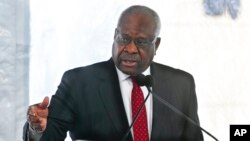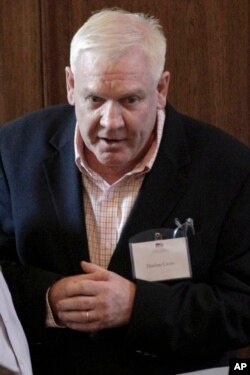A pair of recent news reports describing the relationship between Clarence Thomas, an associate justice on the U.S. Supreme Court, and Harlan Crow, a billionaire donor to conservative political causes, has spurred calls for an overhaul of the ethics obligations applied to the members of the nation's highest court.
The reports, published by the news organization ProPublica, demonstrate that over more than 20 years, Thomas accepted lavish vacations from Crow and, at least once, sold real estate to Crow worth more than $130,000 without reporting the transaction.
At no point during Thomas’ career with the Supreme Court has Crow ever had a case before the body. There have also been no allegations that the relationship between the two men has affected Thomas’ rulings on any specific cases.
Thomas is considered the most conservative justice on the court, and the reports have led some Democratic members of Congress to call on Thomas to resign.
Others have demanded that Chief Justice John Roberts investigate Thomas and set new disclosure standards for high court justices.
Additionally, Senate Democrats have proposed legislation that would codify a set of ethics rules for the high court and create a mechanism for investigating misconduct by any of its nine members, all of whom serve life terms.
Allegations raised
In a story released April 6, ProPublica revealed that over more than 20 years, Thomas and his wife, conservative activist Virginia “Ginni” Thomas, have accepted regular gifts of travel and lodging from Crow. These trips have included flights on Crow’s private jet as well as stays on his 162-foot yacht, or at various homes he owns, including a private compound in the Adirondack Mountains in New York, which Thomas has visited almost every year for two decades.
In a follow-up story released Thursday, ProPublica reported that Crow purchased three pieces of property from Thomas and his family in 2014. The three lots, in Savannah, Georgia, included a house where Thomas lived for part of his childhood, and in which his mother still lived. After the purchase, that home was repaired and renovated, and Thomas’ mother continued to live there.
Federal requirements in place at the time of the transaction, and still in force today, require that an exchange such as the one between the Thomas family and Crow be reported by Supreme Court justices.
Thomas did not report the trips funded by Crow or the real estate transactions on the financial disclosure forms that, as a federal judge, he is required to file every year.
Thomas responds
In response to the first ProPublica story, Thomas said he did not believe he broke any rules by not disclosing the trips he accepted from Crow.
In a statement released to the press, Thomas said, in part, “Harlan and Kathy Crow are among our dearest friends, and we have been friends for over 25 years. As friends do, we have joined them on a number of family trips during the more than quarter century we have known them.
“Early in my tenure at the court, I sought guidance from my colleagues and others in the judiciary and was advised that this sort of personal hospitality from close personal friends, who did not have business before the court, was not reportable. I have endeavored to follow that counsel throughout my tenure, and have always sought to comply with the disclosure guidelines.”
Thomas acknowledged that recent changes to the rules meant that such gifts were now required to be reported, and he said he planned to follow the new rules from now on.
In a statement issued to ProPublica, Crow echoed Thomas’ reports of their close friendship and said, “The hospitality we have extended to the Thomases over the years is no different from the hospitality we have extended to our many other dear friends.”
He added that he had never discussed Supreme Court cases or potential cases with Thomas, and that to his knowledge, neither had any of his other guests.
Thomas has not issued any reaction to the report about the real estate transaction.
VOA specifically asked the Supreme Court multiple times if Thomas had any comment on the second ProPublica story, but as of Friday evening had received no response.
Ethics questions
Professor Renee Knake Jefferson, the Joanne and Larry Doherty chair in legal ethics at the University of Houston Law Center, told VOA that the real estate sale appeared to be a clear-cut example of Thomas flouting the rules.
“The United States Supreme Court does not have a code of ethics that it follows in the same way that other federal judges do,” Jefferson said. “That said, there are some minimum financial disclosure requirements.”
She said one of those is that there is a reporting requirement when a judge sells property to someone outside his or her family.
“He should have disclosed that the property was sold and the amount of money he received for it, and he didn't,” Jefferson said. “That, to me, is pretty straightforward.”
She said that Thomas’ failure to disclose the sale could harm public perceptions of the court.
“It goes to public confidence in our judiciary,” Jefferson said. “Knowing that our justices and judges are adhering to their disclosure requirements gives us confidence in the decisions that they are making when they are on the bench.”
Senators call for change
Before the publication of the story about the real estate transactions, Senator Dick Durbin, who chairs the Senate Judiciary Committee, announced that he would hold a hearing on “the need to restore confidence in the Supreme Court’s ethical standards.”
In a letter to Roberts, co-signed by other Democratic members of the committee, Durbin wrote, “The Senate Judiciary Committee, which has legislative jurisdiction over federal courts and judges, has a role to play in ensuring that the nation’s highest court does not have the federal judiciary’s lowest ethical standards.”
Senator Sheldon Whitehouse called on the Senate to pass the Supreme Court Ethics, Recusal and Transparency Act, which among other things “would require the Supreme Court to adopt disclosure rules for gifts, travel and income that are at least as rigorous as ethics rules for members of Congress.”
Some Senate Republicans came to Thomas' defense after the first ProPublica story was published. Senator John Cornyn, for example, tweeted, "The left is furious it lost control of the Supreme Court, and it wants it back by whatever means possible. The latest effort is a smear on Justice Thomas."
As of Friday evening, there had been no definitive defense of Thomas by Senate Republicans regarding the second ProPublica story.










